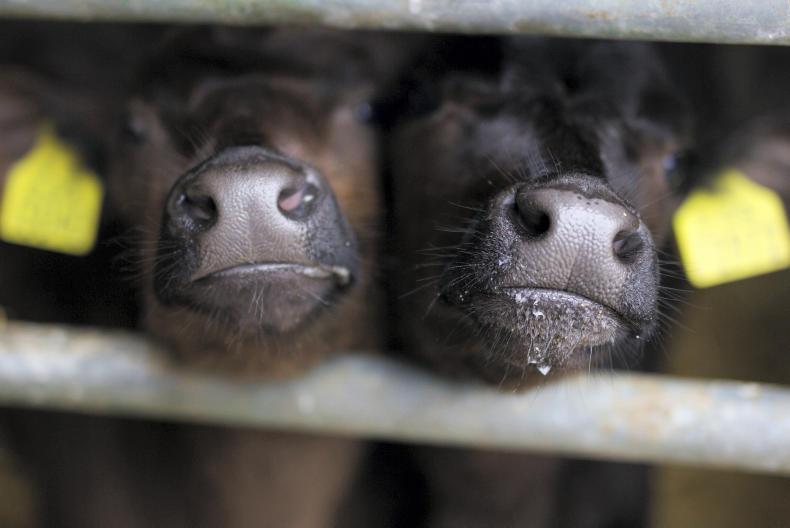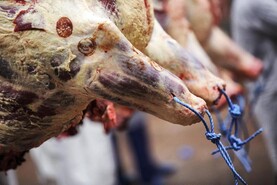The World Organisation for Animal Health’s (OIE) has recognised that the official BSE risk status of both Scotland and Northern Ireland is at the safest level, a move expected to help open international market access for beef exports.
The upgraded status was approved at the OIE annual congress in Paris on Thursday.
This is a significant boost for the beef industry in the north as it improves reputation in target markets and will likely reduce rendering costs at factories.
This will pay dividends in terms of our international reputation
“Northern Ireland has had no cases of BSE since 2012 and this announcement is testament to the tireless efforts of our beef producers and finishers, our red meat businesses, vets, government officials and many others who have worked together to maintain a system of interlocking safeguards against BSE,” chief veterinary officer Robert Huey said.
Bovine Spongiform Encephalopathy (BSE) is one of a group of diseases of the brain which can be fatal. The UK government made is a notifiable disease in 1988 and there have been a range of livestock, food and feed controls in place since then.
NI reaction
Ulster Farmers Union's deputy president, Victor Chestnutt, says the granting of official BSE negligible risk status to Northern Ireland will be welcomed by livestock farmers.
Beef exporters believe securing access to these markets could put an extra £12m a year into the supply chain
“It should help us gain access to key target markets, such as China, USA, Japan, South Korea and the Philippines”, said Chestnutt. “Beef exporters believe securing access to these markets could put an extra £12m a year into the supply chain. In countries we already trade in, it opens up the possibility of amending access agreements. This could boost trade in offals, again adding value to the local supply chain."
It also creates an opportunity to reduce processing charges to farmers, as less Specified Risk Material (SRM) will need to be disposed of, leading to savings of up to £1.2m a year. “Reducing the amount of material now sent for destruction, and using more of the carcase, will also reduce the carbon footprint of the beef sector,” Chestnutt said.
Scottish reaction
The Scottish government announced at the 2016 Royal Highland Show that Scotland would be applying to the World Organisation for Animal Health for BSE negligible risk status. The official application was then lodged on 14 October 2016.
“With Scotland already being recognised as officially TB-free this decision further vindicates our reputation for supplying beef products of the highest quality, produced to the highest standards in the world, and demonstrates the OIE’s acceptance that both our surveillance for, and measures against BSE are stringent," rural secretary Fergus Ewing said.
Republic of Ireland
At present, it will be 2020 before England and Wales are eligible to apply and it will be a year later before the Republic of Ireland can change its BSE status.
Read more
Special feature: BSE 20 years on
The World Organisation for Animal Health’s (OIE) has recognised that the official BSE risk status of both Scotland and Northern Ireland is at the safest level, a move expected to help open international market access for beef exports.
The upgraded status was approved at the OIE annual congress in Paris on Thursday.
This is a significant boost for the beef industry in the north as it improves reputation in target markets and will likely reduce rendering costs at factories.
This will pay dividends in terms of our international reputation
“Northern Ireland has had no cases of BSE since 2012 and this announcement is testament to the tireless efforts of our beef producers and finishers, our red meat businesses, vets, government officials and many others who have worked together to maintain a system of interlocking safeguards against BSE,” chief veterinary officer Robert Huey said.
Bovine Spongiform Encephalopathy (BSE) is one of a group of diseases of the brain which can be fatal. The UK government made is a notifiable disease in 1988 and there have been a range of livestock, food and feed controls in place since then.
NI reaction
Ulster Farmers Union's deputy president, Victor Chestnutt, says the granting of official BSE negligible risk status to Northern Ireland will be welcomed by livestock farmers.
Beef exporters believe securing access to these markets could put an extra £12m a year into the supply chain
“It should help us gain access to key target markets, such as China, USA, Japan, South Korea and the Philippines”, said Chestnutt. “Beef exporters believe securing access to these markets could put an extra £12m a year into the supply chain. In countries we already trade in, it opens up the possibility of amending access agreements. This could boost trade in offals, again adding value to the local supply chain."
It also creates an opportunity to reduce processing charges to farmers, as less Specified Risk Material (SRM) will need to be disposed of, leading to savings of up to £1.2m a year. “Reducing the amount of material now sent for destruction, and using more of the carcase, will also reduce the carbon footprint of the beef sector,” Chestnutt said.
Scottish reaction
The Scottish government announced at the 2016 Royal Highland Show that Scotland would be applying to the World Organisation for Animal Health for BSE negligible risk status. The official application was then lodged on 14 October 2016.
“With Scotland already being recognised as officially TB-free this decision further vindicates our reputation for supplying beef products of the highest quality, produced to the highest standards in the world, and demonstrates the OIE’s acceptance that both our surveillance for, and measures against BSE are stringent," rural secretary Fergus Ewing said.
Republic of Ireland
At present, it will be 2020 before England and Wales are eligible to apply and it will be a year later before the Republic of Ireland can change its BSE status.
Read more
Special feature: BSE 20 years on






 This is a subscriber-only article
This is a subscriber-only article










SHARING OPTIONS: